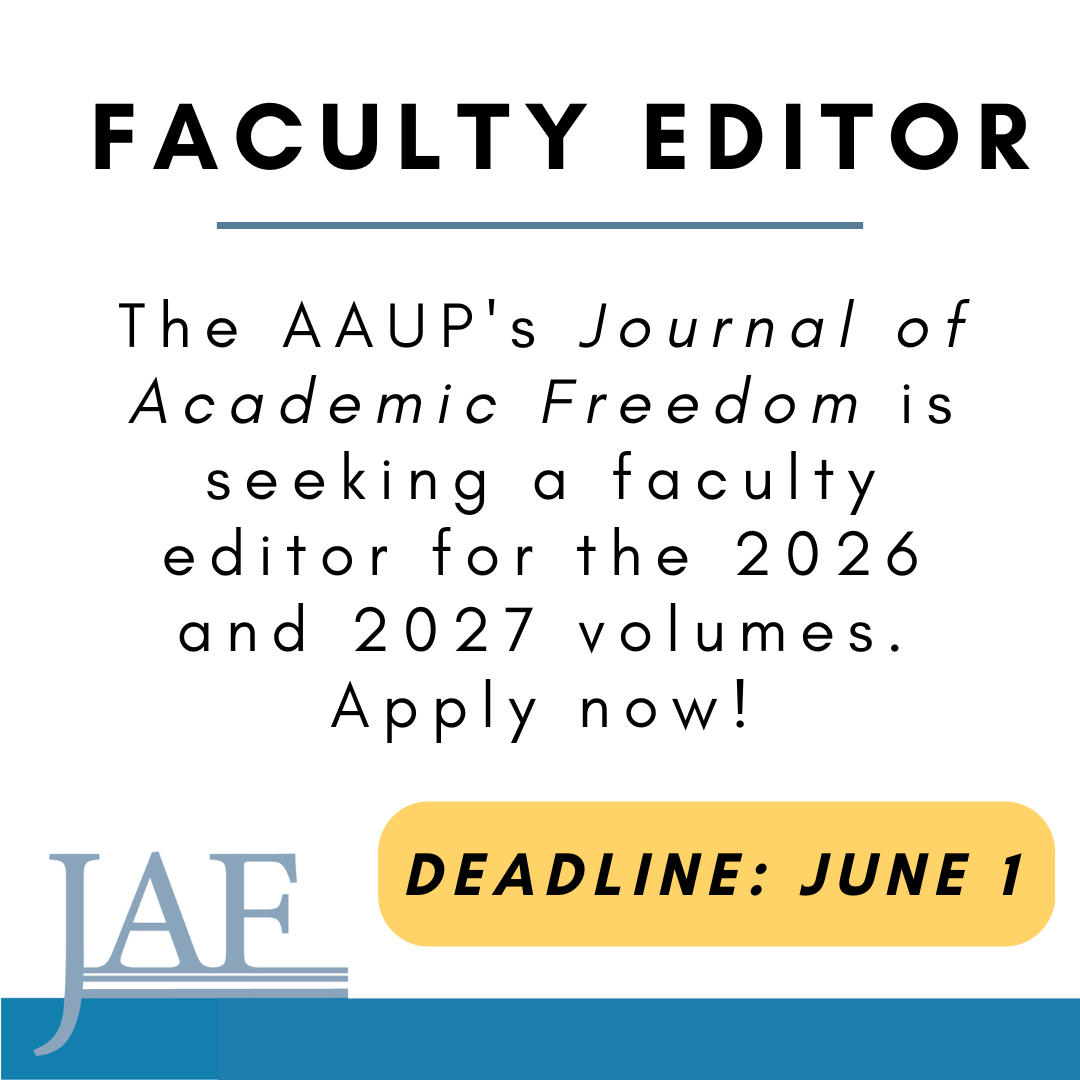- About
- Programs
- Issues
- Academic Freedom
- Political Attacks on Higher Education
- Resources on Collective Bargaining
- Shared Governance
- Campus Protests
- Faculty Compensation
- Racial Justice
- Diversity in Higher Ed
- Financial Crisis
- Privatization and OPMs
- Contingent Faculty Positions
- Tenure
- Workplace Issues
- Gender and Sexuality in Higher Ed
- Targeted Harassment
- Intellectual Property & Copyright
- Civility
- The Family and Medical Leave Act
- Pregnancy in the Academy
- Publications
- Data
- News
- Membership
- Chapters
Faculty Forum: Executive Orders in the Classroom
As the academic year begins, it’s worth considering how our rapidly changing political landscape is reshaping our classrooms and campuses. Last year, the transition back to school was marked by the September 5 executive announcement of the termination of the Deferred Action for Childhood Arrivals (DACA) program. DACA offers undocumented students who came to the United States as children papers that allow them to work legally and enroll in public colleges and universities at in-state tuition rates. More than eight hundred thousand DACA recipients in this country now live under the threat of deportation.
The threatened termination of DACA (on subsequent appeals, lower courts have ruled the termination unconstitutional; it’s likely that the issue will eventually proceed to the Supreme Court) takes place in context of the increasing criminalization of immigration. Non-DACA-mented immigrants have been subject to sudden detention and deportation since enhanced deportation provisions were implemented after September 11, 2001. A presidential campaign run on promises to secure the border and deport “criminal aliens” struck additional terror into many immigrant communities. A 2013 Human Impact Partners study found that fear of coming home to find a parent detained, deported, or disappeared puts the 4.5 million children and teens with at least one immigrant parent at a higher risk of stress and mental-health disorders.
How do threats to DACA affect our campuses? As their communities absorb the strain of many threats, students carry a psychic burden that can affect their academic performance. Further, the termination of DACA would make it more difficult for many students to attend public institutions, as they would lose in-state tuition benefits. For those who might be able to continue their educations, the end of DACA would mean that many more students, undergraduate as well as graduate, would become vulnerable to deportation. (Since not all undocumented students qualify for DACA, there are likely already a small number of non-DACA-mented students on many campuses.)
Do you know what to do if an Immigration and Customs Enforcement (ICE) agent comes to your classroom and asks to speak to one of your students? The uptick in ICE raids in public and semipublic places has already affected K–12 institutions, and raids could easily take place on college campuses as well. All faculty should be familiar with institutional protocols for such events; all institutions should have such protocols in place and educate students, staff, and faculty about them. The immigrant-rights organization Cosecha has produced a “Sanctuary Campus Toolkit” in collaboration with the Harvard Law School Immigration and Refugee Clinical Program to supply information that can guide the production of such protocols. (This and other resources pertaining to sanctuary campuses can be found on the AAUP website at https://www.aaup.org/sanctuary-campuses.)
While the fate of DACA remains in the courts, in July 2018, the Supreme Court affirmed the legality of the “travel ban,” which affects the issuance of visas to applicants from Syria, Libya, Iran, Somalia, Yemen, North Korea, and Venezuela. Because the ban suspends both immigrant and nonimmigrant visas, foreign nationals from these countries who are in the United States on employment visas are now, effectively, stranded here, unable to travel back to their home countries. While the ban provides for some waivers for people who need visas, as of April 30, the State Department had approved only 2 percent of over thirty-three thousand waiver applications. Like DACA students, our students and colleagues affected by the travel ban contend with the stress of being targeted as suspect based on their nations of origin.
Student visas, on paper, are exempted from the travel ban. But, in addition to being subjected to more extensive background checks, which could delay their applications for months, students from these countries are prevented from obtaining work visas to cover their expenses. Graduate students who work as teaching or research assistants during the academic year can neither obtain summer employment nor travel home without fear of being denied reentry. Further, students traveling to the seven countries covered by the ban will be subject to added scrutiny when returning to the United States.
One of the great assets of higher education is its cosmopolitanism, which is now under siege. Situated in cities, towns, and rural areas, our campuses are resolutely global, with students, staff, and faculty from all over the world. Defending this cosmopolitanism is up to all of us.
Rachel Ida Buff is professor of history at the University of Wisconsin–Milwaukee. Academe accepts submissions to this column. Write to [email protected] for guidelines. The opinions expressed in Faculty Forum are those of the author and do not necessarily represent the policies of the AAUP.




